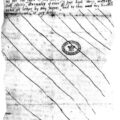To our most noble and virtuous queen KATHERINE,
Elizabeth her humble daughter wisheth perpetual felicity
and everlasting joy.
Not only knowing the affectuous will and fervent zeal, the which your highness hath towards all godly learning, as also my duty towards you (most gracious and sovereign princess) but knowing also that pusillanimity and idleness are most repugnant unto a reasonable creature and that (as the philosopher sayeth) even as an instrument of iron or of other metal waxeth soon rusty unless it be continually occupied. Even so shall the wit of a man, or woman, wax dull and unapt to do or understand anything perfectly, unless it be always occupied upon some manner of study, which things considered hath moved so small a portion as God hath lent me to prove what I could do.
And therefore have I (as for essay beginning, following the right notable saying of the proverb aforesaid) translated this little book out of French rhyme into English prose, joining the sentences together as well as the capacity of my simple wit and small learning could extend themselves. The which book is entitled, or named, The Mirror or Glass, of the Sinful Soul, wherein is contained how she (beholding and contemplating what she is) doth perceive how, of herself, and of her own strength, she can do nothing that good is, or prevaileth for her salvation—unless it be through the grace of God, whose mother, daughter, sister, and wife, by the scriptures she proveth herself to be.
Trusting also that through his incomprehensible love, grace and mercy she (being called from sin to repentance) doth faithfully hope to be saved. And although I know that, as for my part, which I have wrought in it (as well spiritual as manual) there is nothing done as it should be, nor else worthy to come in Your Grace’s hands, but rather all unperfect and uncorrect: yet do I trust also that albeit it is like a work which is but new begun and shapen, that the style of your excellent wit and godly learning in the reading of it (if so it vouchsafe Your Highness to do) shall rub out, polish, and mend (or else cause to mend) the words (or rather the order of my writing) the which I know in many places to be rude, and nothing done as it should be. But I hope, that after to have been in Your Grace’s hands there shall be nothing in it worthy of reprehension and that in the meanwhile no other (but Your Highness only) shall read it or see it, lest my faults be known of many. Then shall they be better excused (as my confidence is in Your Grace’s accustomed benevolence) that if I should bestow a whole year in writing, or inventing ways for to excuse them.
Praying God Almighty, the maker and creator of all things, to guarantee unto Your Highness the same New Year’s Day, a lucky and a prosperous year with prosperous issue and continuance of many years in good health and continual joy and all to His honour, praise, and glory.
From Ashridge, the last day
of the year of our Lord God, 1544.
(Source: Elizabeth I. “Letter to Katherine Parr, 1544.” Transcribed by Anniina Jokinen. Luminarium.
10 Sept 2006. [Accessed on 31st August 2009]. http://www.luminarium.org/renlit/elizlet1544.htm)








I believe Queen Elizabeth I had beautiful handwriting. Is it possible to get an example of a paragraph in her own handwriting?